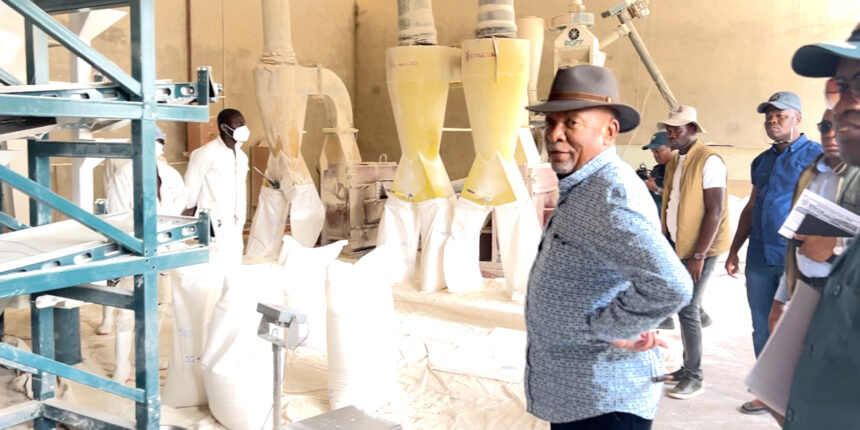SHADIKONGORO – Impressed by the production capacity, technology and operational efficiency at the Shadikongoro irrigation project, President Nangolo Mbumba is convinced that Namibia has no reason to import basic foods at such a high rate.
He made this observation during his recent visit to government’sShadikongoro irrigation project in the Mukwe constituency, Kavango East region.
“We need to produce our own food. We cannot continue to beg other nations for food. With what I have seen here today, we can produce food. Medicines maybe not, as that might be complex. But we have our land to produce our own food in this big, vast country with a small population. We must be proud producers of our own food. It is high time,’’ emphasised the President.
He said all green schemes around the country should realise and understand that there is an urgent need for them to redouble their efforts, and contribute meaningfully to the country’s food security efforts.
Namibia imports nearly 97% of processed agricultural products, the 2023 World Bank report reveals.
This is a worrying figure to Mbumba, who wants it drastically reduced through homegrown food products.
The President also visited the Sikondo, Uvungu-Vungu, Mashare and Ndonga Linena irrigation projects, which all impressed him, despite a few operational challenges that were reported by the various project managers.
Challenges
Some of the challenges highlighted during Mbumba’s visit include a lack of operational combine harvesters and silos at some projects, which he said will be resolved in collaboration with the line ministry.
“I’m glad that all of you, as government irrigation projects, fall under the same ministry. So, let us help one another and produce more as a team. We will continue to give the line ministry the necessary funding because we need the necessary power to produce food,” he added.
Mbumba also visited the Divundu Correctional Facility, which has a large-scale irrigation farm that produces numerous crops for self-sufficiency.
In addition, the facility imparts skills to inmates to enhance their employment opportunities upon release.
The project supplies maize meal, wheat flour, bread and vegetables to almost all Namibia Correctional Services and Namibian Police facilities.
“The facility maintains its consistency in supplying maize meal, wheat flour, wheat grains, vegetables and by-products. It continues to sell different types of produce to the public. The facility supplied maize meal to the Office of the Prime Minister for drought relief.
“Besides donations of food to the public and other entities, we also train a number of inmates in agricultural and industrial skills. But we are challenged with the unavailability of silos and weighbridges to properly quantify and store agricultural produce. Unexpected power outages disturb the operation of the facility. Wild animals and birds destroy crops. Community members destroy the farm fence, and steal farm produce,’’ said assistant commissioner Fillipus Mutumbulwa Ikevali of the Divundu Correctional Facility.
At Shadikongoro, in addition to producing crops, they also produce cooking oil, which is due for the market.
For the coming season, all green schemes have been instructed to produce several hectares of sunflower.
The addition of sunflower is specifically intended to support the oil-processing plant at Shadikongoro, which will benefit from locally-sourced sunflower oil inputs.
Food insecurity
The number of Namibians expected to experience food insecurity is projected to rise significantly, with more than 1.26 million people likely to be affected during the upcoming lean season.
The country is experiencing high levels of food insecurity, with a large number of the population expected to face crisis levels of food insecurity between now and March next year.
This situation is due to several factors, including drought and high food prices.
Climate change is primarily characterised by persistent droughts and erratic rainfall, damaging agricultural productivity as well as food and nutrition security.
In May 2024, the Government of Namibia declared a state of emergency due to El Niño-induced drought, regarded as the worst in 100 years.
This is expected to increase food insecurity. Marginalised groups are especially vulnerable to the impacts of climate shocks due to factors such as limited production capacity and restricted access to resources.
– jmuyamba@nepc.com.na


